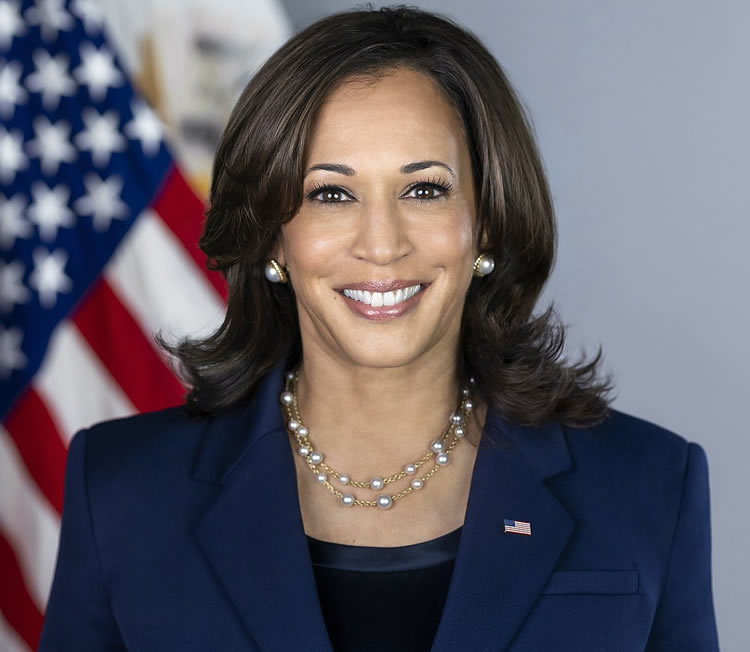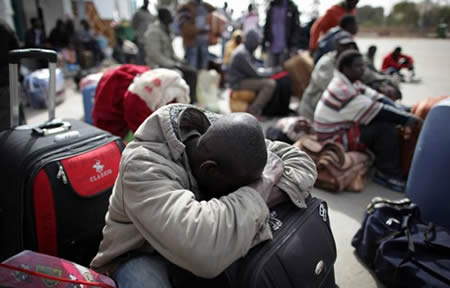Kamala Harris – Born To Break Barriers
- Home
- Kamala Harris – Born To Break Barriers

Kamala Harris – Born To Break Barriers

“My mother would tell us, ‘Don’t just sit around and complain about things. Do something.” – Kamala Harris.
International magazine, Reader’s Digest, reports that growing up with activist parents inspired in Kamala Harris a lifelong passion for making a change in the world, as she explained when she was announced as the Democratic Vice-Presidential Candidate in August 2020.
“My parents would bring me to protests strapped tightly in my stroller, and my mother, Shyamala, raised my sister, Maya, and me to believe that it was up to us and every generation of Americans to keep on marching,” Harris said.
“She’d tell us, ‘Don’t sit around and complain about things; do something. So, I did something.”
“I devoted my life to making real the words carved in the United States Supreme Court: Equal justice under law,” she said.
Kamala Harris is no stranger to breaking barriers, and her elevation to one of the highest offices ever to be occupied by any woman in America’s political history demonstrates her resilience, tenacity of purpose and aspirations in life.
For the records, she is the first female District-Attorney of San Francisco, and the first black female District-Attorney of any city in California.
Next, she was elected as California’s Attorney-General, the first woman and the first black person to hold the position.
In 2016, Kamala became just the second black woman and first South Asian-American elected to the U.S. Senate, and, in 2021, she became the first woman, black person, and South Asian-American to hold the office of Vice-President of the world’s most powerful country.
Birth and early life
Kamala Devi Harris was born on October 20, 1964, in Oakland, California. Her mother, Shyamala, who became a renowned breast cancer researcher, emigrated from India.
Her father, Donald, an Economics Professor at Stanford University, came to the U.S. from Jamaica.
A biography by Liza Knapp-Fadani, a social scientist, on Kamala, says growing up, Harris’s parents made sure she was always in touch with her heritage – attending an African American church in Oakland as well as a Hindu temple.
Starting in childhood and throughout her adulthood, Kamala remained close to her family in India and Jamaica, frequently stating that she had been strongly influenced by her maternal grandfather, an Indian Civil Servant with progressive views on democracy and women’s rights.
Harris’ parents were active in the protests that defined the ’60s.
“I grew up in a hot spot of the civil rights movement,” she told The Washington Post.
“But that civil rights movement involved Blacks, it involved Jews, it involved Asians, it involved Chicanos, it involved a multitude of people who were aware that there were laws that were not equally applied to all people.”
It is reported that when Kamala was seven, her mother and father separated after her father moved to take a professorship at the University of Wisconsin-Madison.
While Kamala Harris kept in touch with her father and his family, it would be her mother, Shyamala Gopalan, who played a more significant role in shaping her.
As a result, Harris and her sister, Maya, had a rich, multicultural childhood.
Education and career development
At age 12, she, along with her mother and sister, Maya, moved to Montreal, Canada.
Here, the activism instincts in Kamala showed even at that very early age when she and her sister organised a reportedly successful protest against the owner of their apartment building, who would not let children play on the building’s lawn.
For her education, she attended the Berkeley’s Thousand Oaks Elementary School, and continued as a student at Westmount High School.
After graduation, she returned to the U.S. in the 1980s and entered Howard University in Washington, D.C., where she earned a B.A. in Political Science and Economics (1986). Then she went back to her home state of California and attended the University of California Hastings College of the Law, where she earned a law degree (1989).
Working experience
The future Vice-President worked as a Deputy District-Attorney (1990–98) in Oakland, earning a reputation for toughness as she prosecuted cases of gang violence, drug trafficking, and sexual abuse.
Kamala rose through the ranks, becoming District-Attorney in 2004.
In 2010, she was narrowly elected Attorney-General of California, winning by a margin of less than one per cent — thus becoming the first female and the first African American to hold the post.
After taking office the following year, she demonstrated political independence, rejecting, for example, pressure from the administration of President Barack Obama for her to settle a nationwide lawsuit against mortgage lenders for unfair practices.
Instead, she pressed California’s case and, in 2012, won a judgment five times higher than that originally offered. Her refusal to defend Proposition Eight (2008), which banned same-sex marriage in the State, helped lead to it being overturned in 2013.
Kamala’s book, Smart on Crime (2009; cowritten with Joan O’C. Hamilton), was considered a model for dealing with the problem of criminal recidivism.
Political life
In 2012, she delivered a memorable address at the Democratic National Convention, raising her national profile.
Widely considered a rising star within the Party, she was recruited to run for the U.S. Senate seat held by Barbara Boxer, who was retiring.
In early 2015, Kamala declared her candidacy, and on the campaign trail, she called for immigration and criminal-justice reforms, increases to the minimum wage, and protection of women’s reproductive rights. She easily won the 2016 election.
When she took office in January 2017, Harris became the first Indian American in the Senate and just the second Black woman.
She began serving on both the Select Committee on Intelligence and the Judiciary Committee, among other assignments.
In fact, she became known for her prosecutorial style of questioning witnesses during hearings, which drew criticism—and occasional interruptions—from Republican senators.
She drew particular attention for her questions to U.S. Attorney-General Jeff Sessions, who was testifying before the Intelligence Committee on alleged Russian interference in the 2016 presidential election.
She had earlier called on him to resign.
Shortly after her memoir: “The Truths We Hold: An American Journey”, was published in January 2019, and Kamala announced that she was seeking the Democratic presidential nomination in 2020.
According to insiders and political analysts, from the outset, she was seen as one of the leading contenders, and she drew particular attention when, during a primary debate, she had a contentious exchange with fellow candidate and future President, Joe Biden, over his opposition to school busing in the 1970s and ’80s, among other race-related topics.
Although Kamala’s support initially increased, by September 2019, her campaign botched, and in December she dropped out of the race.
She continued to maintain a high profile, notably becoming a leading advocate for social-justice reform following the May 2020 death of George Floyd, an African American who had been in police custody.
Her efforts silenced some who had criticised her tenure as Attorney-General, alleging that she had failed to investigate charges of police misconduct, including questionable shootings.
The making of history
As racial injustice became a major issue in the US, many Democrats called on Biden, the Party’s presumptive nominee, to select an African American woman—a demographic that was seen as pivotal to his election chances—as his Vice-Presidential Running Mate.
In August, 2020, Biden chose Harris, and she thus was the first Black woman to appear on a major Party’s national ticket.
She went on to become the first black woman to be elected Vice-President of the US.
Kamala Harris assumed office as Vice-President of the United States on January 20, 2021.
Marital life, religion and beliefs
She is married to Doug Emhoff. The two do not have biological children together, but Emhoff has two adult children from his previous marriage – Cole and Ella.
On religion, the ‘USA Today’ reports that Kamala identifies with the Baptist faith, and attends the Third Baptist Church of San Francisco.
In her autobiography, Harris presents herself as a fighter and as a speaker of truth to power and fighting against white supremacy, homophobia, and crime.
She is a crusader of women’s rights and equality, civil liberty, advancing democratic and accountable governance.
On the day after she was sworn in as a senator in 2016, Kamala addressed the Women’s March.
Looking out at a sea of enthusiastic faces, she said: “Even if you’re not sitting in the White House, even if you are not a member of the United States Congress, you have the power! And we the people have the power!”
By Stephen Asante
Source: GNA
- Share
Classic Ghana
Classic Ghana brings you into a fun world of arts, entertainment, fashion, beauty, photography, culture and all things in between. Let’s explore these together!







